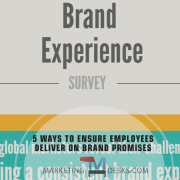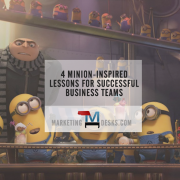Congratulations! Your Employee Culture Is About to Stop Being Relevant to Millennial Workers
21 percent of Millennials left their job to do something else last year, three times more than the rest of the working masses. Here’s what employers need to know to keep Millennials workers engaged and on the payroll.
1 in 5 Millennial Workers Job Hopped Last Year, Gallup Study Shows
Gallup’s latest study on the work and lifestyle preferences of Millennials shows a radical change in how U.S. workers see themselves in relationship to their jobs, employers and careers. This viewpoint is reflected in Millennial workers’ level of engagement (which is lower than any other working generation) and their willingness to look for – and take advantage of – reasons to leave their jobs in favor of other jobs (and sometimes no job at all).
- 21 percent of Millennial workers left their job to do something else last year
- 60 percent of Millennial workers are open to other opportunities
Let’s take a closer look at these numbers in terms of how Millennial workers attitudes about their jobs differ from those of non-Millennials:
| Percentage of workers by generation that agree with these statements: | Millennials | Non-Millennials |
| Left their job last year | 21% | 7% |
| Open to other opportunities | 60% | 45% |
| Going to actively look for a job with a different employer in the next 12 months (assuming an improving job market) | 36% | 12% |
| Engaged at work | 29% | 32-45% |
| Not engaged at work | 55% | 41-50% |
Source: How Millennials Want to Work and Life via Gallup.com
In only one category – the percentage of Millennials workers who say they are actively disengaged at work – did the percentage of workers fall within the range of other generations represented in the study (Gen Xers, Baby Boomers and Traditionalists).
The writing seems to be on the wall – or on the resignation letter, email or text in this case. Younger workers aren’t looking for the same things that their parents and grandparents were looking for in the workplace. Employers must begin to think about how they can foster high engagement with employees in this generation of workers and improve retention rates.
The first step lies in recognizing that younger workers are less likely to be motivated by the same workplace factors as preceding generations. While these are generalizations, and there will always be exceptions, consider this Barclays infographic on the attitudes and preferences of workers of differing generations.

While older generations of workers often worked for the same employer for the majority (or even entirety) of their careers, the attitudes of younger generations, especially beginning with Gen Xers, has evolved. People are far less likely to self-identify by their career progression or working for a particular employer than they are to view “work” as a tool for getting what they really want or doing what they really want. Their aspirations to be travelers, experiencers, doers – these are their self-identifiers; work is a means to an end.
What Millennial Workers Want from Employers
Millennial workers don’t just think about their careers and employers differently than older generations, they think about everything differently. Maturists, Baby Boomers and even Gen Xers may have thrived on self-management and rarely met with managers one on one unless it was time for a performance review or the all-dreaded corrective action. Not so for Millennial workers, and that’s just one area where their work preferences differ from other generations, according to the Gallup study cited previously:
- 44 percent of Millennial workers are more likely to be engaged when their manager provides feedback on a regular basis.
Managers who personally interact with and provide feedback to younger workers on a regular basis are much more likely to successfully engage them. Only one in five Millennials said their managers are meeting with them on at least a weekly basis, and more than half said they don’t even meet with their manager once a month.
- Millennials are digital natives; 71 percent use the internet as their primary source of news and information, compared to 51 percent of Gen Xers, 30 percent of Baby Boomers and just 14 percent of Traditionalists.
While preceding generations completed paperwork to enroll in benefits and went to their HR or payroll department for clarification on benefits, insurance, salary, etc., younger workers prefer to self-enroll and self-manage. They expect employers to provide online access so they can make changes to withholding, benefits, follow up on claims, submit claims, and manage nearly every aspect of compensation-related topics, 24×7.
Workplace characteristics aren’t the only area where Millennials have a distinct difference from other workers. In How the Millennial Generation is Transforming Employee Benefits, a 2012 MetLife study found that Millennial workers are more worried than other generations about “every kind of unforeseen financial risk” including the abrupt, unexpected loss of income to uncovered medical expenses or financial adversity due to unexpected illness or disability. They were also found to be the most risk-averse when it comes to investing, as well. As a consequence, the report indicates that Millennial workers place a premium on employer health insurance and disability programs, more than half are already making contributions toward retirement accounts, and values both employer-contribution investment programs and wealth counseling benefits.
A Harvard Business Review article titled “What Millennials want in a new job” summarized the Gallup study’s findings this way, comparing the importance of various factors that appeal to younger workers vs. preceding generations when looking for a new employer:

From the report, Millennial workers are far likely to place a greater emphasis these traits when deciding to take a new job:
- opportunities to learn and grow
- qualities of their direct manager
- how they perceive the quality of management overall
- whether the work they do interests them
- opportunities for advancement
The traits that mean more to older workers and are less influential to Millennials when looking for a new employer were:
- Overall compensation
- Working for a company that encourages creativity
- Working somewhere “fun”
- Work in an informal or casual environment
You might also like: Millennials Poised to be Most Entrepreneurial Gen Ever
***
A few end notes: Movies like “The Internship” where Vince Vaughn and Owen Wilson play older workers who are trying to get jobs in a company that could be characterized as having a fun, informal and creativity-encouraging environment may lead people to believe that these are the factors younger workers are looking for.
However, data shows that the relationships they have with their direct managers and other company leaders may be far more impactful to Millennial workers, and the decisions they make about whether to stay.
Likewise, while some high profile companies are experimenting with holacracy in terms of organizational culture, flat org charts and unclear reporting relationships may not provide adequate motivation for Millennials who value strong working relationships with business leaders and who are looking for growth and advancement opportunities.










